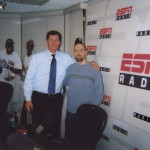There’s an old saying in the media business that you haven’t worked in the industry until you’ve been fired.
The first time that line was uttered to me I thought it was ridiculous. I was naive and believed that if you showed up, worked hard, delivered results, and treated your co-workers well, that would be enough to keep you employed.
Then I learned the hard way why it’s called the radio “business“.
 Early in my career, I was working for a radio station in Poughkeepsie, NY. The morning show I was producing and providing news reports for wasn’t producing the numbers that upper management were looking for. After making numerous changes to try and elevate the ratings, our General Manager felt a change was necessary, so he cut ties with my crew, and hired a new morning show.
Early in my career, I was working for a radio station in Poughkeepsie, NY. The morning show I was producing and providing news reports for wasn’t producing the numbers that upper management were looking for. After making numerous changes to try and elevate the ratings, our General Manager felt a change was necessary, so he cut ties with my crew, and hired a new morning show.
I had a good relationship with the boss so I figured I’d earn the benefit of the doubt to stick around. I was called into his upstairs office and sat down for an important conversation. Little did I realize entering his room that day that it would be the last time I did so.
He was very direct, and honest and told me that because the morning crew I had worked with did not deliver large enough numbers to command the business that the company needed to succeed, he had to bring in new talent to fix the problem. The challenge was that their addition would cost the company more, and increasing the budget was not an option, which meant having to trim salary in other areas.
I was then told that the only way to offset the added talent increases would be to let me go because my salary was too high. I would be replaced by someone with less experience, who’d make less, and that person would approach the situation with a fresh perspective, and great enthusiasm, which is something I’d not have been able to provide if faced with a major pay cut.
I sat there befuddled, trying to comprehend what was happening, and realized that a decision had been made, and it was now up to me to decide how I would let it define me.
I looked my boss in the eyes, shook his hand, thanked him for the opportunity, wished him the best with the new show, and promised him that he had not heard the last from me. He thanked me for my service, and told me he had confidence I would land on my feet and go on to do even bigger things in the future, and he hoped I’d remember the place where I started once I did.
As I packed up my office and left the building, I couldn’t understand why he’d praise me, and talk about my future being bright. All I could mutter to myself was “If you think I’m destined for bigger things, and recognize I do great work, then why am I heading home right now“?
Once I got into my house, and had a few days to digest what had changed in my professional life, I began to put the pieces together, and figure out where I wanted to take my career. I then started pursuing opportunities that I felt aligned with my goals, and I contemplated relocating for the first time in my career.
It took 2 months to gain employment in another market two hours away, and while that stint was rather brief, it became an important stop gap. The time spent there (Albany, NY) allowed me to detach myself from my previous situation, get my mind right, gain my confidence back, and put my focus into doing great work that would put me on the map and help me make a difference on a larger level.
As luck would have it, less than 6 months after moving to Albany, I was hired by ESPN Radio in Bristol, CT, and everything that I had gone through during the previous year became learning material and a big part of my maturation as a professional.
 I remember driving to Bristol prior to my first day of work, and having some time to reflect on everything I had endured during the early part of my career. One of the most memorable and important parts of that journey was being fired. Had I not gone through that difficult period, I’d not have landed in the best situation of my career. Instead I would have remained where I was, doing good work, but not relentlessly pursuing my dreams, and making bigger contributions.
I remember driving to Bristol prior to my first day of work, and having some time to reflect on everything I had endured during the early part of my career. One of the most memorable and important parts of that journey was being fired. Had I not gone through that difficult period, I’d not have landed in the best situation of my career. Instead I would have remained where I was, doing good work, but not relentlessly pursuing my dreams, and making bigger contributions.
I also was able to step back and appreciate how I was terminated. That may sound crazy, but there is a certain way of cutting ties with someone that determines how they remember an individual and their experiences with a particular company.
What I valued from my discussion when I was let go, was that there was no promise of future possibilities, no smoke blown up my ass before parting ways, and there was no ridicule or sign of disrespect.
I was dealt with man to man, in a respectful but firm way, and that not only helped me gain more respect for my former boss, but it made it easy for me to want to keep open a line of communication with him. I’ve tried to remember that approach and use it when I’ve had to be in the same situation.
Terminating someone is never easy, especially when you form a working relationship with them and respect their work. Although I’ve handled some difficult situations well, I’ve also gone through experiences that I wish I managed differently. I’m proud of the fact that I haven’t mastered the way to let people go, because it’s not an area of the profession that I enjoy or seek to become an expert in.
Unless you’ve been in position to cut ties with an individual, it’s hard to understand what it feels like. People don’t see how it affects you the night before or the days/weeks leading up to it. You may want to be yourself around the office but that’s a lot easier said than done.
Contrary to what some may think, bosses wrestle with the conflict of having to do what’s necessary for business, versus thinking about how it will impact the individual’s future and their family. Most employees forget that the person delivering the message, usually isn’t acting alone in the decision process. They just happen to be the one saddled with the responsibility.
 When a boss is charged with being the bearer of bad news, they’re often given instruction of how the company wants something handled. While it’s certainly smart to abide by your employer’s wishes, there are times where you have to step back, and say “screw it, this doesn’t feel right” and get the message across in your own way.
When a boss is charged with being the bearer of bad news, they’re often given instruction of how the company wants something handled. While it’s certainly smart to abide by your employer’s wishes, there are times where you have to step back, and say “screw it, this doesn’t feel right” and get the message across in your own way.
From the receiving end, when you’re hit with news that’s going to change your professional future, it’s impossible to see how it can be a blessing in disguise. Sometimes when we work somewhere, we get comfortable and stop thinking about other possibilities, and it can almost feel like we’re cheating on our employer by even considering other options.
What we lose sight of during those times is that tomorrow is not promised, and the years of service you’ve previously given to a company, don’t guarantee the next few.
As the events of the past two days at ESPN have unfolded, I can’t help but think back on what I went through and offer it as a positive reminder to everyone who is preparing for the next chapter in their careers.
The relationships you’ve created will remain with you, the impact you’ve had on others and the results you’ve produced can not be taken away, and the talents you possess will help guide you to a future opportunity that will make sense for you personally and professionally.
I know it can be difficult to think ahead when you’re focused on today, but if you have talent, confidence, passion, a strong work ethic, a positive attitude, and faith in yourself and your abilities, good things will happen.
 If there’s one thing I know for sure, and this has been echoed by numerous people inside the media industry, there is life after ESPN.
If there’s one thing I know for sure, and this has been echoed by numerous people inside the media industry, there is life after ESPN.
Whether it’s been Rich Eisen, Colin Cowherd, Craig Kilborn, Bill Simmons, Dan Patrick, Bruce Gilbert, and Scott Masteller, or Charlie Steiner, John Seibel, Larry Beil, Rob Dibble, Michael Kim, Darren Smith, and Scott Shapiro, there are plenty of opportunities out there.
Your career isn’t over when you leave the four letter network. In many cases it’s just beginning.
Don’t get me wrong, I loved my time at ESPN, and I’m sure many of the people who are experiencing these layoffs feel the same way. It’s a great operation, with a lot of great people, and no company has invested more in sports programming during my lifetime than ESPN. The work that gets done in front and behind the camera and microphone is second to none, and when operating from a position of strength, it can be a very special place.
However, we’re seeing a major shift in the way sports fans consume content, and those changes are making it harder for companies to operate the way they’re used to. We can all sit here and assess blame for why the company has lost viewers and money, but providing solutions to the issues is what will determine if the company rebounds and has future opportunities available to pursue.
Is there some greed involved in this situation? Yes. Have the costs for rights deals for LIVE sporting events gotten out of hand? Absolutely. But expecting a business to not want to generate the largest profit possible, and sports leagues to give their partners a discount because it might impact their personnel head count is unrealistic. It’s also beyond your control and not worth investing your personal energies in.
 What you can decide though is how you will learn from the experience, and rebound from it. 10 months ago I chose to leave a great position in San Francisco with no assurances that I’d land on my feet. By taking that risk, I now have my son living with me, my family close by, and I’ve started my own company and am enjoying every minute of running it.
What you can decide though is how you will learn from the experience, and rebound from it. 10 months ago I chose to leave a great position in San Francisco with no assurances that I’d land on my feet. By taking that risk, I now have my son living with me, my family close by, and I’ve started my own company and am enjoying every minute of running it.
There are many other great stories too of people who have gone on to make a giant impact in sports media after they had been written off at ESPN or another employer. You could be the next, but it starts by building off of your last experience, not dwelling on the past.
If we’ve learned anything over the years from watching sports, movies, documentaries and sitcoms, America loves a good comeback story. Now it’s up to you to create it. The biggest challenge of your career starts now.

Jason Barrett is the President and Founder of Barrett Media since the company was created in September 2015. Prior to its arrival, JB served as a sports radio programmer, launching brands such as 95.7 The Game in San Francisco, and 101 ESPN in St. Louis. He also spent time programming SportsTalk 950 in Philadelphia, 590 The Fan KFNS in St. Louis, and ESPN 1340/1390 in Poughkeepsie, NY. Jason also worked on-air and behind the scenes in local radio at 101.5 WPDH, WTBQ 1110AM, and WPYX 106.5. He also spent two years on the national stage, producing radio shows for ESPN Radio in Bristol, CT. Among them included the Dan Patrick Show, and GameNight.
You can find JB on Twitter @SportsRadioPD. He’s also reachable by email at Jason@BarrettMedia.com.









